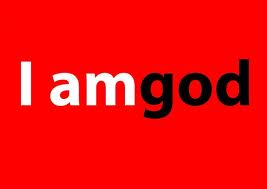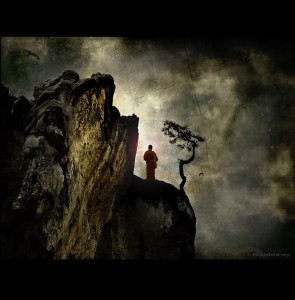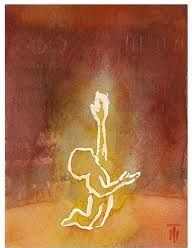Daily Wisdom: God in second person is all about relationship

The most powerful form of God in the second person is almost certainly the prayer experience. It is told that when Hassidic master Levi Yitzchak of Beridchev used to pray he would begin the standard liturgical form of blessing. “Baruch Ata Adonai,” “Blessed are you God,” and then break out of the mold of blessing crying out in sheer joy, ” YOU… YOU”¦ YOU”¦ YOU!” He would lose himself in these words repeatedly shouting in ecstasy, “YOU… YOU”¦ YOU!!!” This is the rapture of God in the second person.
For Levi Yitzchak the blessing is a kind of Buddhist pointing out instruction. It points however not to sunyata or emptiness but to God in the second person. Nachman of Bratzlav taught the spiritual practice of Hitbodedut. In one form this meant walking alone in the forest “talking to God as you would to your friend.”
In God in the second person we meet God and bow. In God in the second person we meet God and partner. In God in the second person we meet God and love. The key however is the encounter. It is the encounter with God in history and in the lived reality of every human being that is the essence of the God in the second person experience.
Dr. Marc Gafni
The Dance of Tears
(in press)

 Sacred hermeneutic is ultimately an erotic act according to the mystics in which the God in the interpreter meets the God and the text and realizes that they are one.
Sacred hermeneutic is ultimately an erotic act according to the mystics in which the God in the interpreter meets the God and the text and realizes that they are one. Every evolved culture and every evolved individual may realize Unique Self when True Self awakens to its Unique Perspective. An early expression of this equation is sourced in pre-modernity in the great teachings of the Kabbalists. For these masters, the sacred text of the Torah is the word of God. Yet, paradoxically, in Hebrew mystical teaching a human being who is deeply grounded in True Self while fully incarnating his or her own uniqueness, also speaks the word of God!
Every evolved culture and every evolved individual may realize Unique Self when True Self awakens to its Unique Perspective. An early expression of this equation is sourced in pre-modernity in the great teachings of the Kabbalists. For these masters, the sacred text of the Torah is the word of God. Yet, paradoxically, in Hebrew mystical teaching a human being who is deeply grounded in True Self while fully incarnating his or her own uniqueness, also speaks the word of God! R. Kook, twentieth century philosopher mystic, teaches that every generation is part of the unfolding revelation of divinity. Each generation, picking up from where the last one left off, moves closer to understanding the full depth and divinity of sacred rites and passages. In this sense the “covenant between me and the children of Israel” is not only between God and the people – but “between” the children of Israel”. and their children ….and their children – a covenant between generations. Israel means for me, borrowing a reading from my teacher Mordechai Lainer of Izbica, based on a close and creative reading of the original Hebrew, Yashar El; the direct apprehension of the divine.
R. Kook, twentieth century philosopher mystic, teaches that every generation is part of the unfolding revelation of divinity. Each generation, picking up from where the last one left off, moves closer to understanding the full depth and divinity of sacred rites and passages. In this sense the “covenant between me and the children of Israel” is not only between God and the people – but “between” the children of Israel”. and their children ….and their children – a covenant between generations. Israel means for me, borrowing a reading from my teacher Mordechai Lainer of Izbica, based on a close and creative reading of the original Hebrew, Yashar El; the direct apprehension of the divine. Even though you and I might deeply believe that the most important function we can perform is to offer auhentic transformative spirituality, the fact is, much of what we have to do, in our capacity to bring decent spirituality into the world, is actually to offer more benign and helpful modes of translation. In other words, even if we ourselves are practicing, or offering, authentic transformative spirituality, nonetheless much of what we must first do is provide most people with a more adequate way to translate their condition. We must start with helpful translations, before we can effectively offer authentic transformations.
Even though you and I might deeply believe that the most important function we can perform is to offer auhentic transformative spirituality, the fact is, much of what we have to do, in our capacity to bring decent spirituality into the world, is actually to offer more benign and helpful modes of translation. In other words, even if we ourselves are practicing, or offering, authentic transformative spirituality, nonetheless much of what we must first do is provide most people with a more adequate way to translate their condition. We must start with helpful translations, before we can effectively offer authentic transformations. God is called in biblical myth “Shadai,” translated by the wisdom masters as, “He who said to his world, ”˜Dai’ – enough.” Two meanings well up from the word. The first is that the creative process was stopped when God said enough. Divinity turned to humanity and said, “I have done enough. You – each one of you – be my partners in completing the work of creation.” Have you ever created something, conceived of a project and then handed over responsibility for it to another. You have to really trust that person to “entrust” to them Your creation. The phrase “Raba Emunatecha” – from the Hebrew liturgy, literally means “Your trust is great.” I read it to mean that God’s trust IN US is great. God entrusts creation into our hands.
God is called in biblical myth “Shadai,” translated by the wisdom masters as, “He who said to his world, ”˜Dai’ – enough.” Two meanings well up from the word. The first is that the creative process was stopped when God said enough. Divinity turned to humanity and said, “I have done enough. You – each one of you – be my partners in completing the work of creation.” Have you ever created something, conceived of a project and then handed over responsibility for it to another. You have to really trust that person to “entrust” to them Your creation. The phrase “Raba Emunatecha” – from the Hebrew liturgy, literally means “Your trust is great.” I read it to mean that God’s trust IN US is great. God entrusts creation into our hands. Love implies not only freedom but responsibility – awesome responsibility. Remember Master Menachem Mendel who was asked by his students, “Rebbe (teacher), where is God?” The master responds, “God is only where you let him in.”
Love implies not only freedom but responsibility – awesome responsibility. Remember Master Menachem Mendel who was asked by his students, “Rebbe (teacher), where is God?” The master responds, “God is only where you let him in.” By
By  “It is written that God withdraws his presence from the world to dwell in the empty space between the Cherubs in the Temple. But how could this be? Is it not also written that all of heaven, indeed all the space in the cosmos, is not enough to contain divinity? “Ah,” says Master Jose. “It is to be likened to lovers. When they quarrel even a palatial home is not enough for their needs, but when they love, they can make their bed even on the edge of a sword.”
“It is written that God withdraws his presence from the world to dwell in the empty space between the Cherubs in the Temple. But how could this be? Is it not also written that all of heaven, indeed all the space in the cosmos, is not enough to contain divinity? “Ah,” says Master Jose. “It is to be likened to lovers. When they quarrel even a palatial home is not enough for their needs, but when they love, they can make their bed even on the edge of a sword.” This spiritual law of the universe plays itself out in many hidden ways which you need to recognize if you truly want to return to love. I want to outline for you areas where, in order to become a lover, you need to give up control. Just as the Hebrew mystics portrayed the God lover as stepping back in order to make space for world, so do we need to step back to create space for our love to flow. First, if we love ourselves, we have to give up our need to be perfect. If you don’t love yourself then you expect perfect self control. If you do love yourself, then you have to allow room for imperfection and failure. Emerson was right when he wrote, “There is a crack in everything that God has made.”
This spiritual law of the universe plays itself out in many hidden ways which you need to recognize if you truly want to return to love. I want to outline for you areas where, in order to become a lover, you need to give up control. Just as the Hebrew mystics portrayed the God lover as stepping back in order to make space for world, so do we need to step back to create space for our love to flow. First, if we love ourselves, we have to give up our need to be perfect. If you don’t love yourself then you expect perfect self control. If you do love yourself, then you have to allow room for imperfection and failure. Emerson was right when he wrote, “There is a crack in everything that God has made.” The pseudo-victim has genuine options which she refuses to action; she refuses to turn fate into destiny and cries more than it hurts. Another kind of pseudo-victim also may have some level of real hurt but more often than not the hurt is more imagined than real and being a victim is a freely chosen role which has many hidden benefits which the pseudo-victim seeks to exploit. The hidden victims of pseudo-victims therefore are real victims.
The pseudo-victim has genuine options which she refuses to action; she refuses to turn fate into destiny and cries more than it hurts. Another kind of pseudo-victim also may have some level of real hurt but more often than not the hurt is more imagined than real and being a victim is a freely chosen role which has many hidden benefits which the pseudo-victim seeks to exploit. The hidden victims of pseudo-victims therefore are real victims.
 There is a tale that educators love about the girl who paints a purple tree. The teacher, who has drawn a tree on the board and asked the children to copy it, is disapproving. “You didn’t copy my tree.”
There is a tale that educators love about the girl who paints a purple tree. The teacher, who has drawn a tree on the board and asked the children to copy it, is disapproving. “You didn’t copy my tree.” In the teaching of Unique Self, the whole/part, autonomy/communion paradox is finally clarified. The Unique Self teaching allows us to create right relationship between whole and part, autonomy and communion. This right relationship is the absolute key to joy, creativity, meaning and peace.
In the teaching of Unique Self, the whole/part, autonomy/communion paradox is finally clarified. The Unique Self teaching allows us to create right relationship between whole and part, autonomy and communion. This right relationship is the absolute key to joy, creativity, meaning and peace. By Marc Gafni
By Marc Gafni
 World Spirituality is not only about coping with life, but about transforming it through mystical realization.
World Spirituality is not only about coping with life, but about transforming it through mystical realization. On MarcGafni.com, a new quote from Dr.
On MarcGafni.com, a new quote from Dr.  In a series of books (e.g., A Sociable God, Up from Eden, and The Eye of Spirit), I have tried to show that religion itself has always performed two very important, but very different, functions. One, it acts as a way of creating meaning for the separate self: it offers myths and stories and tales and narratives and rituals and revivals that, taken together, help the separate self make sense of, and endure, the slings and arrows of outrageous fortune. This function of religion does not usually or necessarily change the level of consciousness in a person; it does not deliver radical transformation. Nor does it deliver a shattering liberation from the separate self altogether. Rather, it consoles the self, fortifies the self, defends the self, promotes the self. As long as the separate self believes the myths, performs the rituals, mouths the prayers, or embraces the dogma, then the self, it is fervently believed, will be “saved”–either now in the glory of being God-saved or Goddess-favored, or in an after-life that insures eternal wonderment.
In a series of books (e.g., A Sociable God, Up from Eden, and The Eye of Spirit), I have tried to show that religion itself has always performed two very important, but very different, functions. One, it acts as a way of creating meaning for the separate self: it offers myths and stories and tales and narratives and rituals and revivals that, taken together, help the separate self make sense of, and endure, the slings and arrows of outrageous fortune. This function of religion does not usually or necessarily change the level of consciousness in a person; it does not deliver radical transformation. Nor does it deliver a shattering liberation from the separate self altogether. Rather, it consoles the self, fortifies the self, defends the self, promotes the self. As long as the separate self believes the myths, performs the rituals, mouths the prayers, or embraces the dogma, then the self, it is fervently believed, will be “saved”–either now in the glory of being God-saved or Goddess-favored, or in an after-life that insures eternal wonderment. In
In